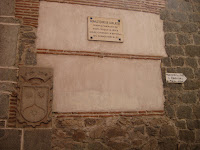An Easter Homily given this morning at Holy Hill, the Basilica of the National Shrine of Mary, Help of Christians... Happy Easter!
The Lord is risen! He is truly risen! Alleluia!
Brothers and sisters, there is NO love like the love of God in Jesus Christ. Pope John Paul II once wrote that in Christ Jesus, we have a God who actively goes out in search of man. God is PASSIONATE for the man and the woman He created—He is passionate for each and every one of you and me.
How passionate? Our God is passionate enough to accept being immersed in OUR suffering, and even to surrender the power of death… so to enter into our pain and our loneliness and our fear. In His Son, Jesus Christ, God scours the very depths of HELL to look for us and to take us upon His broad shoulders and to bring us home to Himself.
It was YOUR flesh and MY flesh that God took to Himself in order to reveal to us A LOVE STRONGER THAN DEATH. This is the meaning of our Easter celebration. After the horrific suffering of the crucifixion, and the abandonment and the shame, God reveals the gift of RESURRECTION. Jesus told His disciples, “I am going away and I will return to you. I do not leave you orphans.” Though at times we may think God is silent HE NEVER abandons us. When we think He does not remember us in our suffering, it is especially then that God is most active preparing a dwelling for us.
It is not ONLY Christ’s victory we celebrate today, but the promise of OUR VICTORY in Jesus. Following the homily, we will be sprinkled with the new Easter water, that symbolizes the waters poured upon us in Baptism. On the day of your Baptism, God made an eternal covenant with you. Through the action of the priest in the company of the whole Church, God etched into your being the very name of His Son and planted in you the seed of eternal life. We bear this SEED.
“I have come that you might have life and have it to the FULL!” We Christians worship a God who has the power and the DESIRE to give us ETERNAL LIFE. ETERNAL LIFE is not a perpetual continuation of the life we experience now. It is life of abundant love and joy, a life that has NO fear or self-concern. It is the life we LONG for in the depths of our hearts—to know a LOVE that has no end or conditions.
It is our Christian belief that the gift of RISEN life begins here on earth. Brothers and sisters, we are not celebrating an event of the past, or an event somewhere in the future. It is a reality NOW…. We who are baptized into Christ’s death are baptized into His resurrection. But the disciples running to the tomb in today’s Gospel show us HOW we are to receive this gift of new life. We are told Peter and the other disciple whom Jesus loved ran to the tomb, the other disciple who arrived first, BENT DOWN and LOOKED into the empty tomb, saw the burial cloths, entered the tomb and BELIEVED. We are called to BEND DOWN, to make ourselves small as it were—to put aside our selfishness, our pride, our resentment of others—and to believe—to humble ourselves before the mystery of Jesus Christ risen from the dead. Many do not come to know Jesus as Lord, even many baptized Catholics, because they refuse to run to the tomb, to humble themselves and to believe. They insist on holding on to the hurt and anger that is so familiar, rather than to embrace the freeing love of Christ Jesus that makes us new.
It is marvelous, it that we Catholic Christians believe that the Risen Jesus touches our lives and transforms us EVERY TIME we receive the Sacraments—when we come to Holy Communion, when we receive the Sacrament of Penance—we encounter the Risen Jesus. How many Catholics do not come to Mass because they think there is nothing to be gained there! And yet EVERY time we receive the Eucharist, we receive the RISEN LIFE of Jesus Christ into our own body and soul! We can go pray by ourselves, go get exercise, commune with nature and even stand on our heads, BUT nothing can give us the RISEN LIFE that we receive in the EUCHARIST.
God wants us to receive His Risen Life… Consider the person you love most and how you would so desire to give them what is most intimate to yourself … imagine then, that person you love then casually dismissing this most intimate gift of yourself. How much more Christ wishes to give us the gift of His Risen Life in the Eucharist. Do we eagerly meet Him? We received the seed of eternity in the gift of Baptism and Christ wishes to nourish that seed into FULLNESS.
Today, let us run to the empty tomb moved by love and let us bend down and humble ourselves so to receive through faith the gift of Christ’s Risen Life. He is our Savior, now and forever. He loves us without condition and calls us to now share in the abundance of His life. He desires only that we should know and possess His joy which is a life forever free of fear, sin, and death.



